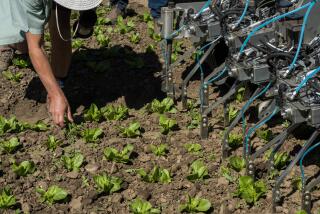Future Food: What Are the Genetic Engineers Cooking Up?
- Share via
John Payne, associate director of biotechnology, biologics and environment protection at the U.S. Agriculture Department’s Animal and Plant Health Inspection Service, estimates that there are almost 300 projects under way to develop genetically engineered plants through recombinant DNA.
Here are a few examples on the shopping list:
Tomatoes--”You can’t be a self-respecting ag-tech company and not have a genetically engineered tomato,” said Ray Moshy, president of ESCAgenetics, a San Carlos, Calif., biotechnology firm. The Calgene Flavr Savr tomato has gotten the most attention--probably because it will be first on the market--but a few other companies, including ESCAgenetics, are coming out with their own genetically engineered tomatoes.
The idea is to turn off the genes that control softening so that these tomatoes can be allowed to ripen on the vine but still not turn mushy when shipped. Presumably, this would create a better-tasting tomato. Currently, most tomatoes are picked green and turned red with ethylene gas.
ESCAgenetics wants to improve tomatoes headed for processing. Since tomatoes are mostly skin and water, increasing the amount of solids could have big economic advantages for processors, Moshy said. So that’s what ESCAgenetics is doing--inserting a gene in tomatoes that would increase their solids content.
Potatoes--Similarly, Frito-Lay and Monsanto are genetically engineering higher-solids potatoes. The objective for Monsanto is twofold, according to James Altemus, spokesman for the company. A potato with more starch and less water would hold up better during processing since potatoes are almost exclusively mechanically harvested and a lot are bruised as they bump into conveyor belts. Secondly, a potato with less water would absorb less oil when it is deep fried, so French fries potentially could be less fatty.
Corn--A couple of firms are working on implanting a gene into sweet corn that would prevent the sugars from being converted to starch, thus keeping the vegetable sweet long after it is picked.
Cooking oils--Some companies are working to improve the nutritional profiles of canola, soybean and corn oils by lowering the amount of saturated fat, or raising the amount of monounsaturated fats in the plants from which they are derived.
Coffee--A few companies are trying to turn off the gene in coffee plants that causes caffeine to form. This would decrease the processing costs of decaffeination, said Richard Laster, president of DNA Plant Technology Corp., and could also result in better-tasting decaffeinated coffee. Some flavors are extracted from coffee during the decaffeination process, he said.
Cantaloupe and squash--Asgrow, a seed company subsidiary of Upjohn, is about 1 1/2 years away from selling cantaloupe and squash seeds that would grow into plants resistant to viruses that can destroy entire crops. A small piece of the gene that actually causes the virus has been transferred into a chromosome in the plants, according to John Sorenson, executive director of vegetable research for Asgrow. In a manner similar to a vaccine, the presence of the virus actually keeps the plants from getting it. Sorenson added that the viruses do not affect humans.
More to Read
Eat your way across L.A.
Get our weekly Tasting Notes newsletter for reviews, news and more.
You may occasionally receive promotional content from the Los Angeles Times.










